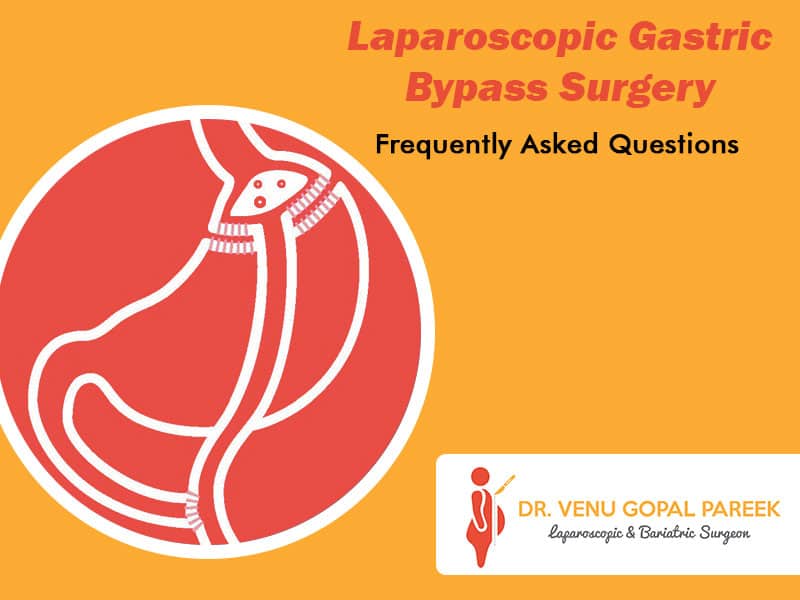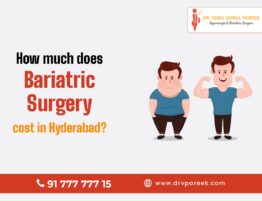
Do you have questions about gastric bypass surgery? Well, we have the answers!
Obesity is a problem that is developing throughout the world. According to WHO, obesity has doubled since 1980. Most people who are worried about obesity and other weight-related disorders may get help with weight loss procedures such as gastric bypass, gastric balloon, or sleeve surgery. If Bariatric surgery is recommended for you or someone you know, you need to know everything about this procedure and answer all your questions before agreeing to the operation. In this blog post, we answer general questions about gastric bypass surgery to help you understand the process of weight loss better.
Dr Venu Gopal Pareek, an obesity surgeon, based in Hyderabad, realises that the decision for weight loss surgery is essential. Patients like you might have questions about Laparoscopic Gastric Bypass Surgery.
To answer some of these questions, here are the most common questions Dr Venu Gopal Pareek heard from people who had undergone Laparoscopic Gastric Bypass Surgery.
Read the questions below the article to find answers to some of the most common gastric bypass questions!
What is gastric bypass surgery?

Gastric bypass is an operation that reduces the size of the patient’s stomach and cuts a portion of the small intestine and reattaches to neostomach to reduce calorie intake. By reducing the number of calories a person consumes, they can effectively lose weight through a healthy, sustainable diet and regular exercise. It is also known as “Roux-en-y” surgery.
What can I expect during gastric Bypass Surgery?
You can expect general anaesthesia during gastric bypass surgery. Your stomach is stapled at the top and reduced to one ounce – the size of an egg. After the neostomach is sewn, the surgeon cuts your small intestine and attaches part of it directly to a newly made pouch in your stomach.
What can I expect after a Gastric Bypass?

After the procedure, a doctor may not let you eat for a day or two to help the healing process. During the next 12 weeks, you will undergo a strict diet that starts with fluids and eventually allows you to eat healthy food. Gastric bypass not only helps you lose weight, but also other diseases that are often associated with obesity, such as type 2 diabetes, high blood pressure, high cholesterol, sleep apnea, and gastroesophageal reflux (GERD). The results of gastric bypass are very dependent on your ability and commitment to make changes in your diet and exercise.
What is laparoscopy?

Laparoscopy is a minimally invasive surgical procedure where the surgeon gets access to the abdominal cavity through 4 to 6 small incisions in the abdominal wall. A device called a laparoscope gives the surgeon a clear view of the inside of the abdominal cavity. This surgical approach is considered “minimally invasive” because of tiny incisions. Nearly all our bariatric surgeon operations are performed laparoscopically.
What Are the Benefits of Laparoscopic Surgery?

- Less discomfort after surgery because the wound is much smaller
- Much smaller scars
- The hospital stay is shorter
- Faster recovery time
- Return early to your activities
How soon after the weight-loss surgery can we eat?
During the first two weeks after surgery, you will go on a liquid diet with a protein shake. In the third week, your diet will be switched to a mushy diet, which is a compound and soft foods such as meat, fish, wheat cream, tuna salad and eggs and other soft foods. After this week, you will return to a regular diet if you make progress.
What type of weight loss can I expect?

Many patients lose more than 100 pounds in the first year. Some patients lose weight more than two years after the procedure and can lose more than 200 pounds during this time. Results vary from patient to patient, and the best results can be seen in patients who are committed to lifestyle changes. Remember that weight loss surgery is not a miracle cure. It is essential to set realistic weight loss goals right from the start. It is possible to lose about 2 to 3 pounds a week in the first year after surgery, but one kilogram a week is more likely. You lose weight gradually and steadily.
What Is the recovery time for gastric bypass?

Recovery time for gastric bypass is about six months. Recovery time is so long that your body has to adapt to lose weight quickly and change eating habits. You can expect to lose 40 to 60 percent of your excess weight in the first two years if you eat healthily and exercise regularly.
How to get the best results?
Follow the instructions from your surgeon and nutritionist for the best results. Also, recommend that you join the support team. Support groups give you additional tips and motivation to promote your long-term weight loss.
Dr Venu Gopal Pareek most successful patients (those who have lost the most and continue to lose weight) are very focused on Changing Lives. If you change your lifestyle and adopt healthier habits, you can get amazing results.
How long does a patient stay in the hospital after gastric surgery?
The average operating time for gastric bypass is around 2 hours. Laparoscopy has fundamentally changed obesity surgery. Almost all of our patients can walk a few hours after surgery. The day after the operation, they can have a liquid diet. The majority (more than 95%) of patients stay in the hospital for only one or two nights.
How safe is a gastric bypass?
There is no operation without risk, and obesity surgery has certain risks. These risks are discussed in detail during the consultation so that the right decisions can be made. All bariatric operations carry the risk of incision, bleeding like other surgeries, and sometimes lung problems, stroke or heart attack, complications from anaesthesia and constipation. This risk is more significant for patients who are overweight.
Does scar tissue remain?

After surgery or injury, scar tissue formed inside the abdomen. Adhesions can occur in the abdominal cavity during each operation. For most patients, they are not big enough to cause problems.
Do patients experience pain after surgery?
Despite the possibility of postoperative pain, every effort will be made to control the pain so that you can take action at the beginning of recovery. It helps avoid problems and speed recovery. Sometimes several drugs are used together to relieve postoperative pain. Your surgeon will discuss other pain treatment options with you.
Conclusion:
Although gastric bypass procedures have a high success rate, patients often worry about whether they should consider weight loss surgery. The answers in this blog post can help you decide on gastric bypass surgery. If you are looking for a leading bariatric surgery clinic in Hyderabad, Dr Venu Gopal Pareek is the best doctor for you.
He has a permanent record of the successful procedure of bariatric surgery for weight loss. The surgeon and nutritionists also inform patients about obesity surgery and lifestyle changes after surgery. Make an appointment with Dr Venu Goapl Pareek to see if you meet the requirements for gastrointestinal surgery.
To schedule an appointment for a consultation with Dr Venu Gopal Pareek bariatric surgeon, call 91-777-77715.







